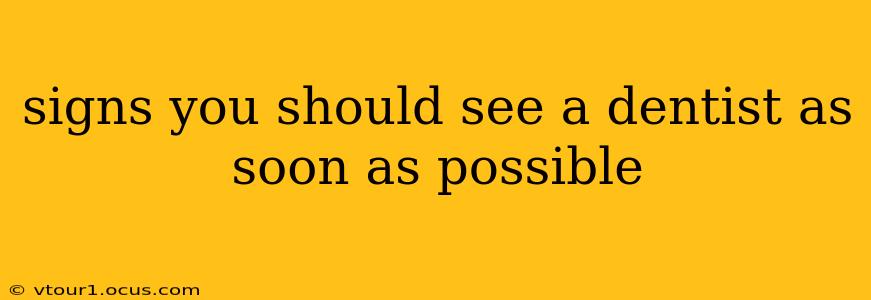Maintaining good oral hygiene is crucial for overall health, but sometimes, despite our best efforts, problems arise. Knowing when to seek immediate dental attention can significantly impact the outcome and prevent more serious complications. This guide outlines several warning signs that necessitate a trip to the dentist as soon as possible. Ignoring these symptoms could lead to irreversible damage or costly treatments down the line.
Persistent Toothache or Severe Sensitivity
A toothache is a common reason for seeking dental care, but the intensity and persistence of the pain matter. A throbbing, sharp pain that doesn't subside with over-the-counter pain relievers, especially if accompanied by swelling, is a major red flag. Similarly, sudden or extreme sensitivity to hot or cold temperatures that lingers, suggesting potential nerve damage or decay, warrants immediate attention. Don't wait for the pain to become unbearable; timely intervention often results in less invasive and expensive treatment.
Swollen Gums or Bleeding Gums
Inflamed or swollen gums (gingivitis) are often the first sign of gum disease. While mild gingivitis can sometimes be addressed with improved oral hygiene, persistent swelling, redness, and bleeding gums are serious indicators of periodontitis, a more advanced stage of gum disease that can lead to tooth loss. If your gums bleed frequently even with gentle brushing, or if you notice significant swelling and pain, schedule a dental appointment immediately.
Loose or Shifting Teeth
Noticing that your teeth are becoming loose or shifting positions is a clear sign of underlying problems, most often gum disease or bone loss. This is not something to take lightly. The supporting structures of your teeth are weakening, and prompt professional intervention is necessary to prevent further tooth loss. Early diagnosis and treatment can help preserve your teeth and restore their stability.
Abscess or Swelling in the Mouth
An abscess is a pus-filled pocket of infection that can develop at the root of a tooth or in the gums. This is a serious condition requiring immediate dental attention. Symptoms include intense pain, swelling, fever, and possibly difficulty opening your mouth. Abscesses can spread infection to other parts of your body, making prompt treatment critical to prevent potentially life-threatening complications.
Persistent Bad Breath (Halitosis)
While occasional bad breath is common, persistent halitosis that doesn't improve with brushing and flossing could signal an underlying oral health problem. This could range from gum disease to cavities to a more serious infection. While mouthwash might temporarily mask the odor, it doesn't address the root cause. See your dentist to identify and treat the source of the bad breath.
What if I have a dental emergency outside of regular business hours?
Many dental practices provide emergency contact information on their websites or answering machines. Alternatively, look for emergency dental services in your area. These services are equipped to handle urgent situations and provide immediate relief.
How can I prevent future dental emergencies?
Regular dental checkups and cleanings are essential for maintaining good oral health. Proper brushing and flossing techniques, a healthy diet, and limiting sugary drinks and snacks all contribute to minimizing your risk of dental emergencies.
This article is for informational purposes only and does not constitute medical advice. Always consult with a qualified dental professional for any concerns about your oral health.
